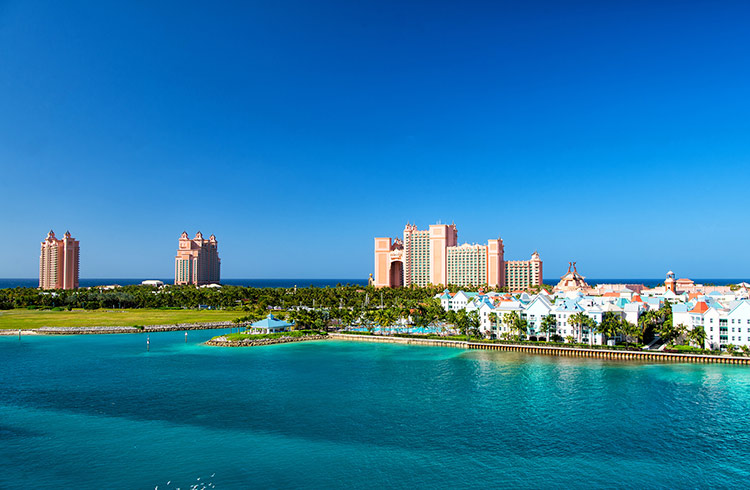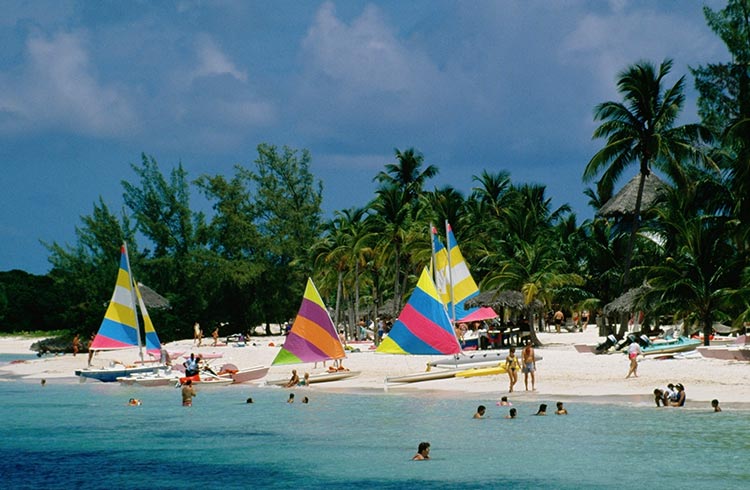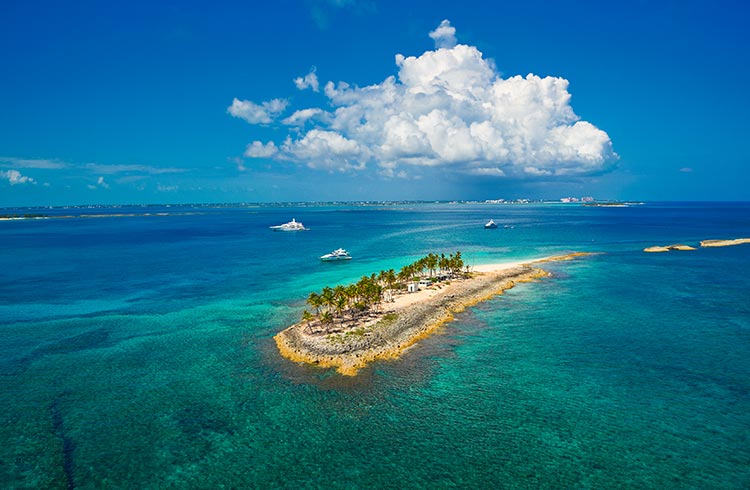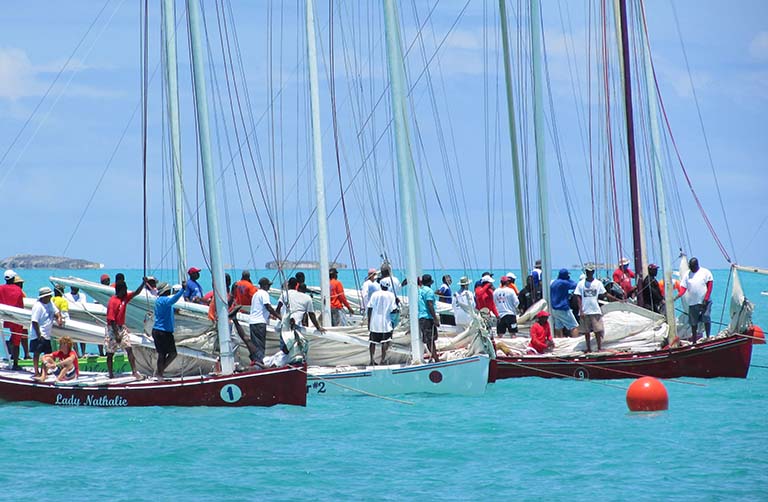Is The Bahamas Safe? What You Should Know About Crime
Our Caribbean travel safety expert, Diedre McLeod, shares her tips on how you can stay safe while traveling in The Bahamas.
 Photo © iStock/photosvit
Photo © iStock/photosvit
The Bahamas is a picturesque archipelago of more than 700 islands and cays in the Caribbean and is where I spent some of my childhood, developing a quirky local accent that I couldn’t shake. It’s also where I learned of the existence of pink sandy beaches, and that Bahamians have an unrivaled love for conch meat. The islands are world-renowned for their beaches, seafood, eco-friendliness and adventure activities.
Here are my top safety tips for travelers who are going to visit The Bahamas.
- Safe places to go in The Bahamas
- The Bahamas: is it safe for families?
- Safety for LGBTQ+ travelers
- Safety for solo women
- Safety at night
- Petty crime
- Violent crime
- Gun laws
- Drugs and alcohol laws
- High prices
- Traffic in The Bahamas
- Sun safety
Safe places to go in The Bahamas
Your safety needs will vary across the islands and largely depends on where you visit.
Nassau – cultural and capital city
Nassau is where 70% of locals live, and the best place to learn the customs and history of the country. While in downtown Nassau, you need to be alert and on the lookout for pickpockets and ATM scammers. However, across the bridge on Nassau Paradise Island, this resort-filled town is home to safe hotels, like the Atlantis hotel.
Be cautious when visiting the ‘Over-the-Hill’ community (south of Shirley Street) in Nassau. The community has cultural significance as the birthplace of the national festival of Junkanoo, but much of the violent crime in The Bahamas is concentrated ‘over the hill’. Avoid walking there at night, especially alone, and visit in groups if you can.
Safety on the other islands
The other islands (such as Abacos, Andros, Eleuthera, Exumas – locally called Family Islands or Out Islands) are generally safer than Nassau or New Providence, with little violent crime occurring. However, here a few things to look out for:
- Make sure to book tours with reputable operators to avoid scams by fraudulent tour guides
- Many jet ski operators are unregulated. Rent from those recommended by the tourist office, confirm price and allotted time before jetting off, and keep track of your time on the jet ski to avoid being called back too early
- Double-check your snorkeling and diving gear to be sure they function well.
Visit outside of the rainy season
Something to consider when traveling to The Bahamas is the hurricane season, which runs from June to November, when the islands can get hit by storms. The islands of Abaco and Grand Bahama were particularly badly damaged by Hurricane Dorian in August 2019, which was the most intense tropical cyclone on record to hit The Bahamas.
Health concerns after a lot of wet weather include Chikungunya virus and Dengue Fever, the two main mosquito-borne illnesses. Pack insect repellant and apply at dawn and dusk liberally to avoid mosquitoes at their most active time.

The Bahamas: is it safe for families?
You should prioritize booking organized tours that are run by reputable companies, which will help your family stay safe while exploring The Bahamas. Other safety tips include:
- Watch the heat. The Bahamas averages 83ºF (28ºC) daily. Protect your family from heat exhaustion by exploring early morning and late evening on hot days. Also, keep hydrated.
- Child-proof everything. Check the height of balconies and move anything that could fall or looks potentially dangerous. Keep windows and doors locked, in case your toddler wanders out of your accommodation.
- Have a code word for family members to use in high-stress situations or when they feel unsafe. For example, walking into a crowded market or street where it’s easy to become separated, saying the code word will help children be alert and stick close to older family members.
- Keep constant watch of your family members, especially children, at marine parks or the beach. Using arm floats on younger children, for example, does not guarantee that your child is fully protected from drowning.
- Children are prone to accidents. Consider getting travel insurance, in case of injury or accident during your activities on the islands.
Safety for LGBTQ+ travelers in The Bahamas
The Bahamas is slowly becoming LGBTQ+-friendly. Limit public displays of affection, regardless of your sexual orientation. You'll find plenty of accommodation options that are generally known for their tolerance of LGBTQ+ couples.
Safety for solo women visiting The Bahamas
There are so many beaches to discover in The Bahamas, offering different activities on each island. If you’re a woman traveling alone, here’s what you need to know to stay safe.
- While the islands are considered safe for women travelers overall, consider dressing modestly for your trip
- Always take precautions while out at night to ensure your safety, such as taking a licensed taxi to a club or restaurant rather than walking, particularly in Nassau
- Avoid hitchhiking, walking in deserted or poorly lit areas, and walking alone at night
- Some Bahamian men can be more direct in their advances and you might find yourself navigating awkward conversations with sexual innuendos. Suggesting a partner/husband is nearby can help to stop these discussions in their tracks.
Safety at night
It’s easy to get distracted wandering around a new place, soaking up the sights and making sure you maximize the hours in a day. Travelers love going drinking and clubbing in The Bahamas, and the addition of alcohol and lowered inhibitions can reduce your alertness substantially. Especially at night, be aware of your surroundings and your belongings.
Petty crime in The Bahamas
Don’t keep your valuables all in one place. Snatch-and-grab crimes involving travelers’ bags, jewelry, smartphones or cash are some of the most popular petty crimes that happen to visitors in The Bahamas. If anyone tries to rob you, hand over whatever it is they are asking for. It's not worth getting hurt.
Violent crime in The Bahamas
Most of the serious crimes committed in The Bahamas center largely in Nassau (New Providence). Violent crime, such as sexual assault, robberies and gang violence, tends to happen most in Nassau’s “Over-the-Hill” neighborhoods and are mainly targeted to Bahamians. If, however, you find yourself the victim of a violent crime, report it to the nearest police station.
Gun laws
Unsurprisingly, it's illegal to bring a gun or ammunition into the country, or have one in your possession without permission. Anyone coming by boat must leave firearms on their vessel when coming ashore and declare their firearms to Customs. Punishment for breaking these laws is strict.
Drugs and alcohol laws in The Bahamas
- Drug possession and drug use are illegal in The Bahamas. The convicted can sit in jail for a while and pay large fines. That said, it's still possible that you may be offered drugs outright when you're in The Bahamas, whether it's out on the street or at the bar or club. As a result, police presence has increased in the traveler hubs for the safety of visitors.
- Yes, marijuana is illegal – although it is commonly smoked by some Bahamians. Do not attempt to leave the islands with marijuana, and reconsider buying any from locals as it will be difficult to verify the quality.
- You must be 18 years or older to drink alcohol in The Bahamas, but laws are often not enforced. There has been, however, more push to curb this so make sure to walk with your ID when going out for a drink.
- Pay attention to your drink. Do not leave your glass unattended and make sure you watch closely when your drink is being opened or poured out for you. Spiking drinks with drugs is sometimes done to unsuspecting visitors.
High prices
- The Bahamian dollar closely matches the US dollar, which means you may not get as much “bang for your buck” as you expected. In traveler hubs, like on Paradise Island, you will definitely attract higher costs for food at supermarkets or restaurants
- If you want to catch a cheaper meal, then eat where locals eat. Try going to downtown areas for more affordable options
- And if you feel like flexing your negotiation skills, then just steps away from the cruise ports in Nassau is the historic Straw Market. With hundreds of vendors, and a range of cultural Bahamian crafts to choose from, get ready to bargain for the best deal. There might be, however, some pushy vendors trying to sell you souvenirs as you walk through market stalls. To avoid prolonged encounters, I suggest confidently responding “not interested” to their advances and keep it moving.
Traffic in The Bahamas
- You’re most likely to encounter bad traffic in the capital city of Nassau, located on New Providence Island. Whether you are driving, taking taxis, or the local bus (affectionately called jitneys) you should plan ahead.
- Jitneys are everywhere, but it’s a casual service with no real timetable, so you may find yourself waiting odd time-intervals for a bus. Keep an eye out for pickpockets on jitneys.
- Never take unlicensed taxis and avoid taxis with broken meters. Regulated taxis carry a yellow license plate marked with the letters “NP”.
- The ferry service in The Bahamas is safe to take. It takes frequent trips between Nassau and Eleuthera, Andros, Long Island, or Grand Exuma.
- There are also small boat services, called mail boats, that sail to the lesser inhabited islands. Mail boats are slow and transport goods and products; however, you can pay to hitch a ride but you won’t find much comfort.
Sun safety
The Bahamas gets about 340 sunny days per year and average temperatures of 83ºF (28ºC). You'll need to slap on plenty of sunscreen to avoid getting a sunburn. Ensure you use reef-safe sunscreen to protect the islands’ natural coral reefs.
Related articles
Simple and flexible travel insurance
You can buy at home or while traveling, and claim online from anywhere in the world. With 150+ adventure activities covered and 24/7 emergency assistance.
Get a quote

9 Comments